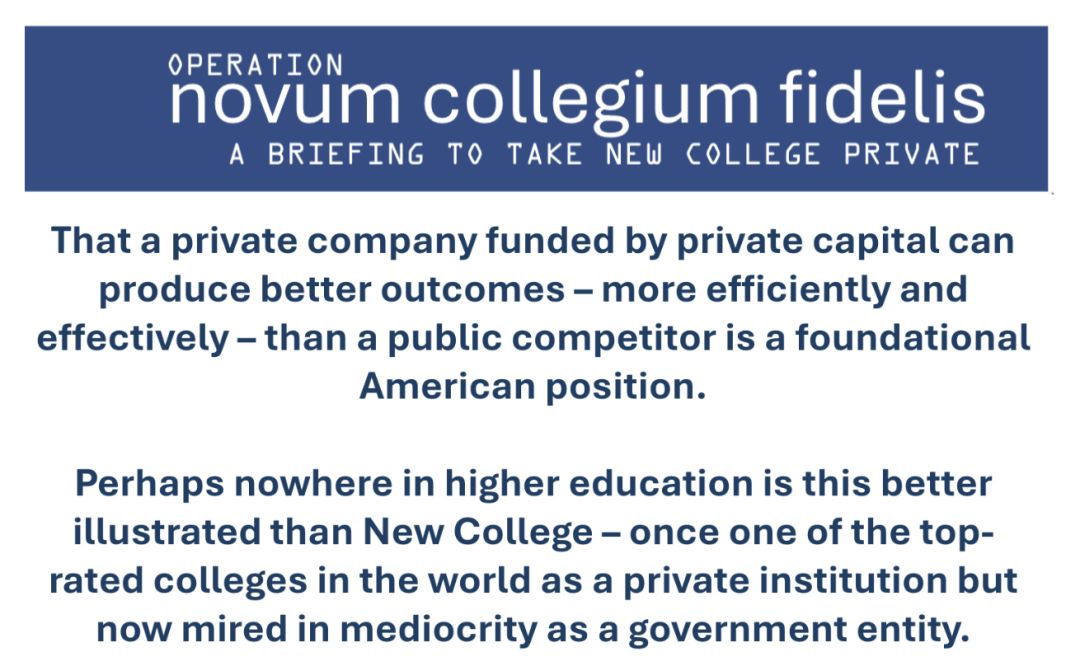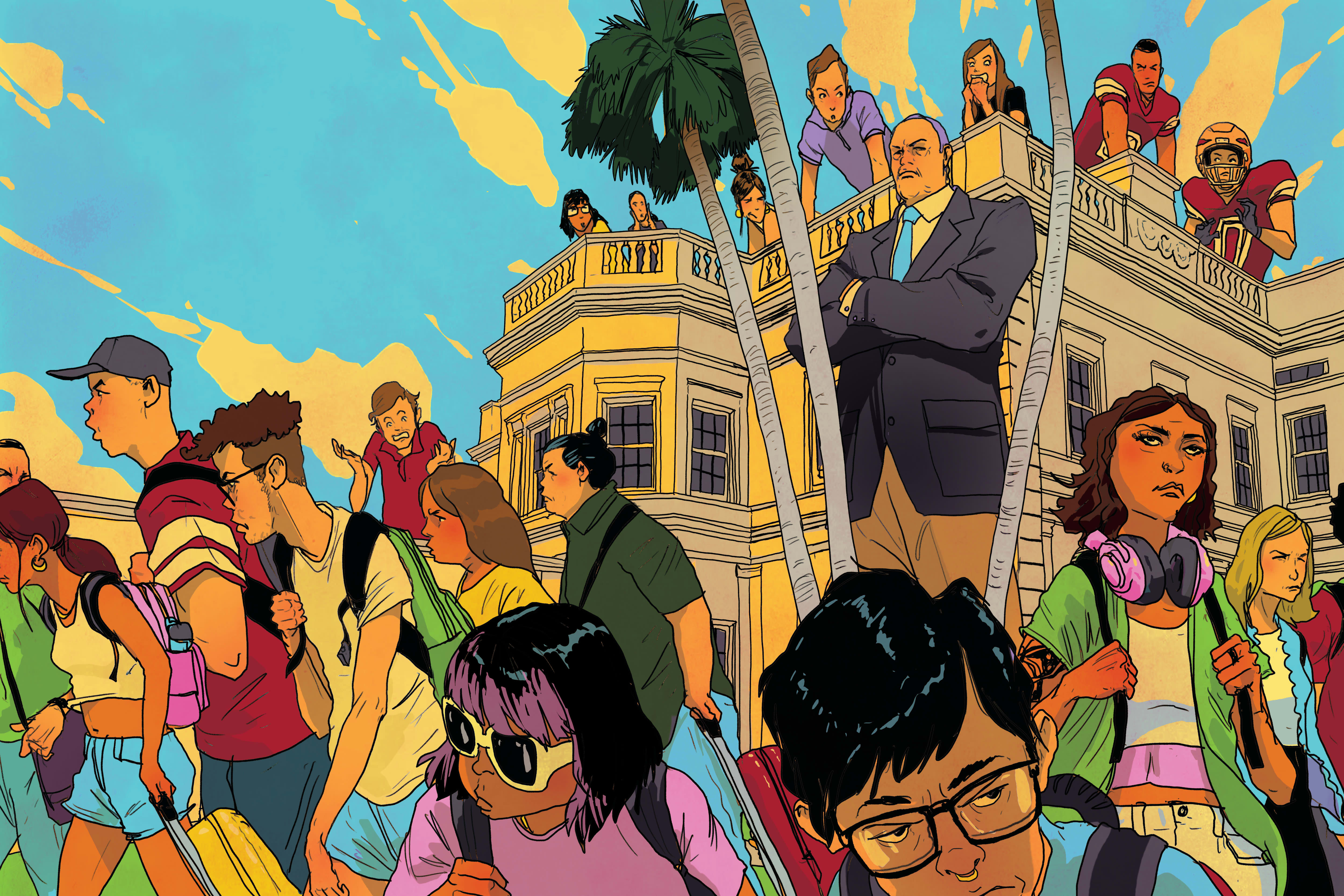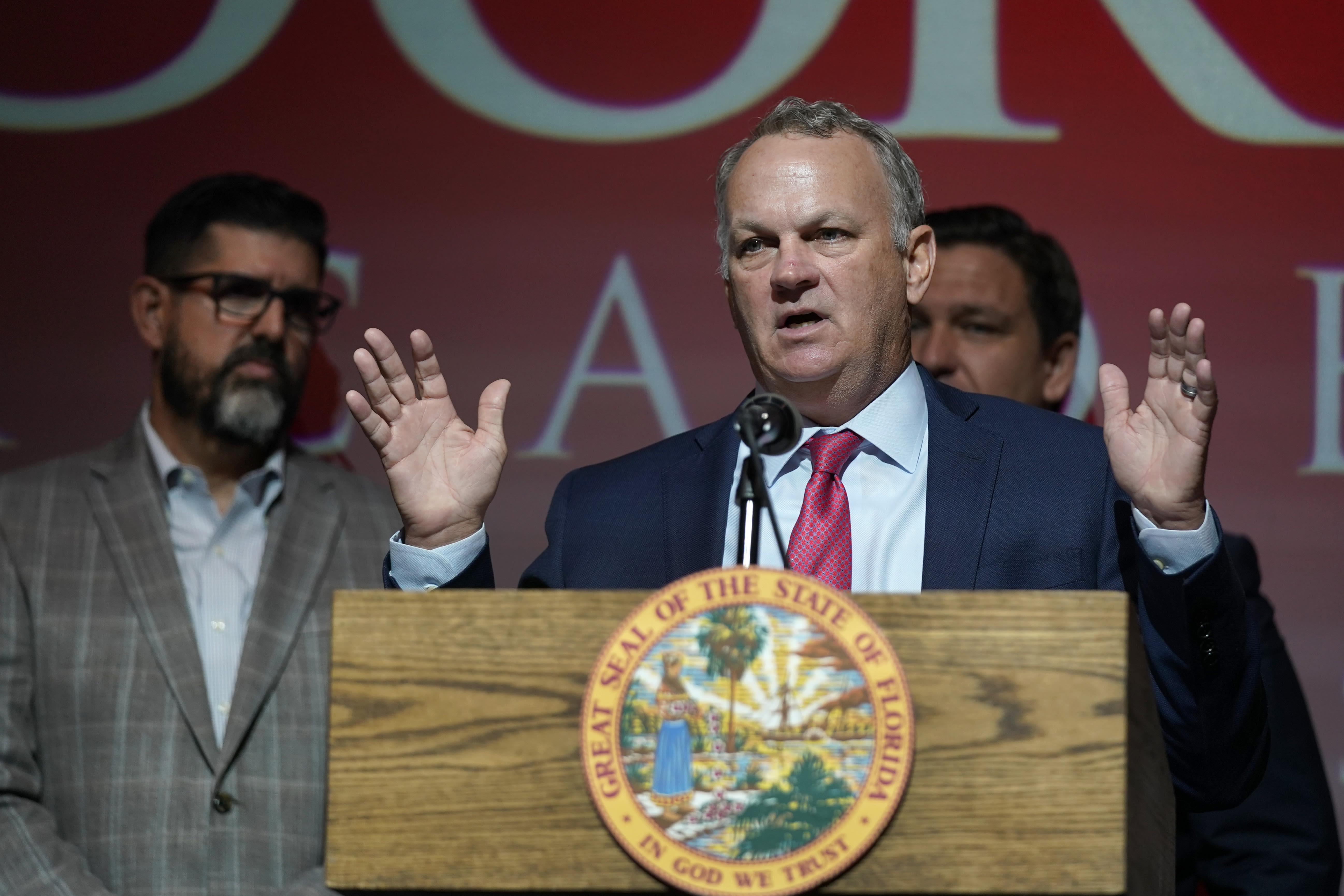
Privatization Push Emerges at New College as Ex-Insider Breaks With DeSantis Allies

A former senior member of New College of Florida President Richard Corcoran’s administration is leading a push to privatize the institution—a dramatic turn for a conservative insider once tapped to help carry out Gov. Ron DeSantis’ ideological overhaul of the Sarasota-based school.
Nathan Allen, a New College alumnus who served as Corcoran’s vice president of strategy and special projects in 2023 and 2024, said his experience inside the project left him disillusioned and convinced that the college’s future is not secure under the current administration or state control.
Allen has laid out a multi-million-dollar proposal to wean New College off taxpayer dollars over the next decade, arguing that the surge of state funding that fueled the school’s conservative makeover has been misdirected and cannot be relied on to last. His plan, if realized, would require a tuition hike and bring about the college’s second radical transformation in as many years.
“This college has one fickle benefactor, and that's Tallahassee,” Allen told Suncoast Searchlight during an interview. “The minute that that benefactor decides that it doesn't want to spend this kind of money on the college, what does the college do?”
Allen has so far campaigned quietly, speaking one-on-one with alumni, faculty and community members, but his pitch has already gained traction with prominent figures. Among them are Nancy Parrish, the former John and Mable Ringling Museum Foundation board chair who fought DeSantis’s attempt to transfer the museum to New College, and Ben Brown, who resigned as Alumni Association chair in March over concerns about the school’s handling of its $50 million endowment.
Their support reflects a growing unease that the college’s current trajectory is unsustainable.
Allen’s argument takes a long view—he posits that the school, which originally was private, should never have been turned public in the 1970s. He and his allies also point to more recent concerns, like falling test scores, a desire to maintain a high level of academic rigor and growing classroom management problems as evidence that Corcoran’s reinvention has undermined the very qualities that once defined New College.
“From my perspective,” Brown says, “they not only botched the execution, they engaged in a lot of hypocrisy.”
Asked about Allen’s proposal, Corcoran is blunt.
“Nathan Allen is a friend and has had many brilliant ideas, but this one is a dead zero,” Corcoran told Suncoast Searchlight in a written statement. “We are proud to be a part of the #1 State University System in America. We want to continue to offer exceptional, traditional and classical ideas in a liberal arts education for all.”
Once known for its quirky, queer and left-leaning student body, Florida’s only public liberal arts honors college became a key focal point for DeSantis’ efforts to reshape higher education. In early 2023, the governor replaced much of the school’s Board of Trustees with political allies and helped install Corcoran, a former Florida House speaker and education commissioner, as president.
The new leadership moved swiftly to eliminate diversity and inclusion (DEI) programming and gender studies, launch an athletics program and aggressively recruit student athletes—changes that triggered an exodus of faculty, inflamed alumni and reshaped the college’s academic culture.
At the same time, concerns about financial transparency and decision-making mounted. The administration poured money into new initiatives, like the new athletics program, while awarding Corcoran a compensation package worth more than $1 million a year. A Suncoast Searchlight investigation found those worries reached the top levels of the college, where former finance officers said they were dismissed after objecting to attempts to tap private donations for the president’s salary.
It’s in this political morass that Allen is now trying to win support to take the school private.

Image: Courtesy Nathan Allen
Rising Costs Fuel Doubts Over New College Survival
Allen, who graduated from New College in 1995 and has worked in venture capital and educational technology, was hired amid the transition, drawing notice for a personal blog where he frequently criticized American higher education, progressive politics and, at times, New College itself.
Those writings helped position him as an ideological ally of the new leadership, which brought him in during the conservative remake.
But once inside the administration, Allen said, he became convinced that the transformation was built on shaky foundations—propped up by political money, misguided admissions changes and leadership he saw as out of step with the liberal arts tradition.
In his pitch for privatization, Allen decries New College’s reliance on state appropriations and claims the school has never been well-suited for the State University System, pointing to its unusually high cost in taxpayer dollars per student. The state spends around $91,000 per New College pupil compared to an average of about $10,000 for students at other state-run institutions.
The state’s appropriations for the school also have nearly doubled in recent years—rising from $35.5 million in 2021 to $62.4 million in 2024, and peaking at $66.5 million in 2023, the year DeSantis launched his overhaul, budget records show.
“If you're interested in government efficiency, the biggest financial and operational boondoggle in the state is your pet project,” Allen says of New College. “You've got something going here that's wildly and sort of incorrigibly inefficient.”
Allen also blasted the college’s handling of admissions under Corcoran’s leadership, pointing to the school’s aggressive recruitment of student athletes and evidence of falling test scores as proof of a stark departure from the school’s historical role as an honors college known for its weighty, self-guided thesis projects and narrative evaluations in lieu of grades.
“I was the only person in College Hall who understood what liberal arts means,” Allen says. “You know, Richard [Corcoran] has a few lines, but he cannot go into depth about what the point of this place is, and neither can anyone else there. These are not academically minded people.”

Image: Suncoast Searchlight
In a presentation he shares while pitching the idea of taking New College private, Allen includes a 10-year roadmap to end reliance on public dollars, requiring $70 million in startup capital. For every year in the proposal, the state allocates less, while out-of-state tuition ramps up.
“That a private company funded by private capital can produce better outcomes — more efficiently and effectively — than a public competitor is a foundational American position,” reads a final slide in the presentation.

Unlikely Allies Unite Behind Privatization Proposal
Allen’s libertarian argument for privatizing New College might have, in a different era, angered alumni, community members and faculty.
That may not be true anymore.
“One of the things that I have loved most [about New College]—and it's been really important to me in staying here—is that it is public and extremely affordable,” says a faculty member who heard the privatization pitch and requested not to be named for fear of retribution from the school. “But at the same time, I don't think the college will survive this.”
The professor says the influx of student athletes has taken a toll on classroom culture and voices support for any plan that would preserve the college’s academic programming.
“I've had behavioral issues that require classroom management strategies that I've never had to use at this college,” says the professor, who described students wearing earbuds in class and walking out of the classroom to wander the halls. “I've had colleagues who have come to me complaining about how they don't know how to handle the students in their class.”
Brown, the former chair of the New College Alumni Association, says that he hopes alumni—who have taken on a vocal role opposing Corcoran’s handling of the school—would have a seat at the table in any public campaign.
Brown tells Suncoast Searchlight that he initially saw in DeSantis’s takeover of the college a kernel of optimism.
“I think that the conservative critique of higher education initially had some merit, that they were arguing that the environment had become somewhat stifling, that there was too much of an emphasis on political correctness,” Brown says.
That evaporated as the school took what he saw as measures to restrict speech on campus, limiting access to e-forums and removing mailbox decorations and chalk art. He said his concerns about financial transparency drove him both to leave his position in March and, more recently, to back Allen’s proposal.
Brown’s support underscores how frustration with the school’s trajectory has spread beyond its usual critics and taken root among alumni who once gave the overhaul the benefit of the doubt.
That shift has made Allen’s idea sound less like an outsider’s provocation and more like part of a broader reckoning with what the school has become.
And while the notion of privatizing a public liberal arts college may seem radical, it can also be understood as an escalation of a larger pattern. For decades, Florida has overseen the outsourcing of public services to the private sector, with K-12 education at the front line in that fight.
“We certainly know that there's been a big movement to privatize public services,” says Aubrey Jewett, a professor of political science at the University of Central Florida. “Over the last 40 or 50 years, we have seen lots of contracting out, lots of privatization ... so, if you look at it like that, just because it hasn't happened before, maybe it's not so off the wall.”


